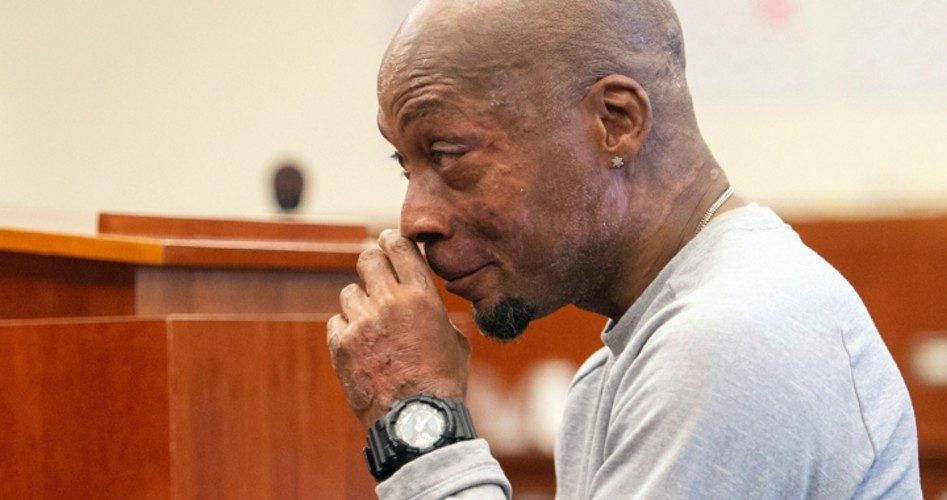
A San Francisco jury has found agrochemical company Monsanto liable for causing a school groundskeeper’s cancer in a case that could turn a powerful tide against the biotech giant — also the world’s leading producer of genetically modified seeds — as the recent claim is just one of thousands against the company. Bayer, which purchased Monsanto just two months ago, has already seen its shares plummet after the loss.
According to California school groundskeeper Dewayne Johnson (shown), exposure to Monsanto’s Roundup is what caused his non-Hodgkin’s lymphoma. The product’s key ingredient is glyphosate, which was classified by the UN World Health Organization as “probably carcinogenic to humans” three years ago. Bloomberg News reports that Johnson mixed and sprayed hundreds of gallons of Roundup in his job as a groundskeeper. He was diagnosed with cancer in 2014, and by July 2017, after chemotherapy and other treatments, he was given six months to live. Johnson contends that it was his exposure to Roundup, which included accidents that resulted in his being soaked in the product, that caused his cancer.
Johnson’s lawyer, Brent Wisner, provided evidence that Monsanto scientists were aware of the cancer risk posed by the product as early as the 1970s but kept it from the public and even went out of their way to “distort the truth.” Wisner said in a statement after the verdict, “Despite the Environmental Protection Agency’s failure to require labeling, we are proud that an independent jury followed the evidence and used its voice to send a message to Monsanto that its years of deception regarding Roundup [are] over and that they should put consumer safety first over profits.”
The court ordered Monsanto to pay $250 million in punitive damages and $39 million in compensation and other costs.
The case marks a major victory for Americans who are opposed to pesticides and herbicides. As noted by the Environmental Working Group (EWG), Roundup is the most commonly used herbicide in the world, and traces of glyphosate have been found in foods, including children’s cereals such as Cheerios and Trix.
Cases against the product are being made all across the world, according to Phys.org. A beekeeping cooperative in northern France, for example, filed a legal complaint against Bayer after discovering traces of glyphosate in batches of honey.
Some countries agree that glyphosates are dangerous. In August, a federal judge in Brazil ruled that new products containing glyphosate could no longer be registered in the country. The Sri Lankan government outright banned imports of glyphosate in 2015 after agricultural groups criticized the government for failing to conduct the necessary scientific research. That ban was lifted in July, though the use of glyphosate remains restricted. BBC News reports that French president Emmanuel Macron has been working to ban glyphosate in the country but has faced resistance from some French lawmakers.
But the U.S. Environmental Protection Agency continues to insist that the product is safe. However, critics claim that the EPA assessment was determined because of collusion between government officials and Monsanto — claims that seem to be supported by the evidence provided in Johnson’s case.
Monsanto’s lawyers released a written statement that continues to claim that glyphosate is a safe product: “Today’s decision does not change the fact that more than 800 scientific studies and reviews — and conclusions by the US Environmental Protection Agency, the US National Institutes of Health and regulatory authorities around the world — support the fact that glyphosate does not cause cancer, and did not cause Mr Johnson’s cancer.”” The main assertion seems to be that since glyphosates are the world’s most common weedkiller, if it caused cancer, it would be very evident. The jury in the case was empaneled in San Francisco, a state that also recently said that coffee must carry a warning label because it may cause cancer, and the jury did not claim that the pesticide caused Johnson’s cancer, rather that it likely substantially contributed to it. The company claims the product is safe if used according to directions.
On Monday, Bayer’s market value plunged by $11.4 billion following the verdict that surprised investors, the Chicago Tribune reports. Bayer’s shares dropped as much as 12 percent. Investors fear that the trial was a test of the evidence against Monsanto for thousands of other claims being made against Roundup.
Photo: AP Images




